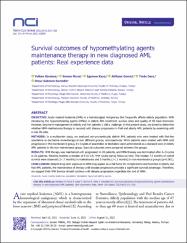| dc.contributor.author | Karakuş, Volkan | |
| dc.contributor.author | Maral, Senem | |
| dc.contributor.author | Kaya, Egemen | |
| dc.contributor.author | Gemici, Aliihsan | |
| dc.contributor.author | Dere, Yelda | |
| dc.contributor.author | Sevindik, Ömür Gökmen | |
| dc.date.accessioned | 2023-05-26T08:05:02Z | |
| dc.date.available | 2023-05-26T08:05:02Z | |
| dc.date.issued | 2022 | en_US |
| dc.identifier.citation | 336 | en_US |
| dc.identifier.uri | https://search.trdizin.gov.tr/tr/yayin/detay/1130076/survival-outcomes-of-hypomethylating-agents-maintenance-therapy-in-new-diagnosed-aml-patients-real-experience-data | |
| dc.identifier.uri | https://hdl.handle.net/20.500.12868/2187 | |
| dc.description.abstract | OBJECTIVE: Acute myeloid leukemia (AML) is a hematological malignancy that frequently affects elderly population. With introducing the hypomethylating agents (HMAs) in elderly AML treatment, survival rates and quality of life have improved. However, long-term management in elderly and frail patients is still a challenge. In the present study, we aimed to determine whether HMA maintenance therapy is required until disease progression in frail and elderly AML patients by examining with a real-life data. METHODS: In a multicenter study, we analyzed non-promyelocytic elderly AML patients who were treated with first-line azacitidine or decitabine monotherapy in two different groups, retrospectively. While patients were treated with HMA until progression in the maintenance group, 6+3 cycles of azacitidine or decitabine were administered as a standard care of elderly AML patients in the non-maintenance group. Survival outcomes were compared between the groups. RESULTS: HMA therapy was maintained until progression in 20 patients, and HMA therapy was terminated after 6+3 cycles in 21 patients. Patients received a median of 6 (1–14) HMA cycles during follow-up time. The median 7.5 months of overall survival were observed (2–17 months) in maintenance and 3 months (1–13 months) in non-maintenance groups (p=0.001). CONCLUSION: Despite long-term exposure to HMA may appear as a risk factor for complications and toxicities in elderly and frail AML patients, the maintenance of therapy until disease progression provides a significant survival advantage. Therefore, we suggest that HMA therapy should continue until disease progression regardless the sort of HMA. | en_US |
| dc.language.iso | eng | en_US |
| dc.relation.isversionof | 10.14744/nci.2021.42800 | en_US |
| dc.rights | info:eu-repo/semantics/openAccess | en_US |
| dc.subject | Acute Myeloid Leukemia | en_US |
| dc.subject | Azacitidine | en_US |
| dc.subject | Decitabine | en_US |
| dc.subject | Hypomethylating Agents | en_US |
| dc.title | Survival outcomes of hypomethylating agents maintenance therapy in new diagnosed AML patients: Real experience data | en_US |
| dc.type | article | en_US |
| dc.contributor.department | ALKÜ, Fakülteler, Tıp Fakültesi, Temel Tıp Bilimleri Bölümü | en_US |
| dc.identifier.volume | 2022 | en_US |
| dc.identifier.issue | 9 | en_US |
| dc.identifier.startpage | 4 | en_US |
| dc.identifier.endpage | 331 | en_US |
| dc.relation.journal | İstanbul Kuzey Klinikleri | en_US |
| dc.relation.publicationcategory | Makale - Uluslararası Hakemli Dergi - Kurum Öğretim Elemanı | en_US |


















